5 books about Public opinion polls
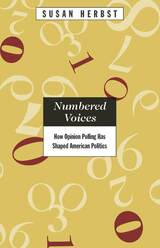
Numbered Voices
How Opinion Polling Has Shaped American Politics
Susan Herbst
University of Chicago Press, 1993
Quantifying the American mood through opinion polls appears to be an unbiased means for finding out what people want. But in Numbered Voices, Susan Herbst demonstrates that the way public opinion is measured affects the use that voters, legislators, and journalists make of it.
Exploring the history of public opinion in the United States from the mid-nineteenth century to the present day, Herbst shows how numbers served both instrumental and symbolic functions, not only conveying neutral information but creating a basis authority. Addressing how the quantification of public opinion has affected contemporary politics and the democratic process, Herbst asks difficult but fundamental questions about the workings of American politics.
"An original and thought-provoking analysis of why we have polls, what they accomplish, and how they affect the current political scene. Herbst's scholarship is impeccable, her writing is clear and crisp, and her findings are original. . . . Every reader will benefit by carefully weighing the issues she raises and the conclusions she draws."—Doris A. Graber, Political Science Quarterly
"An intelligent, theoretically rich, and historically broad account of public opinion over several millennia. . . . The historical accounts are interesting and her interpretations are thought-provoking."—Paul Brace, Journal of American History
Exploring the history of public opinion in the United States from the mid-nineteenth century to the present day, Herbst shows how numbers served both instrumental and symbolic functions, not only conveying neutral information but creating a basis authority. Addressing how the quantification of public opinion has affected contemporary politics and the democratic process, Herbst asks difficult but fundamental questions about the workings of American politics.
"An original and thought-provoking analysis of why we have polls, what they accomplish, and how they affect the current political scene. Herbst's scholarship is impeccable, her writing is clear and crisp, and her findings are original. . . . Every reader will benefit by carefully weighing the issues she raises and the conclusions she draws."—Doris A. Graber, Political Science Quarterly
"An intelligent, theoretically rich, and historically broad account of public opinion over several millennia. . . . The historical accounts are interesting and her interpretations are thought-provoking."—Paul Brace, Journal of American History
[more]
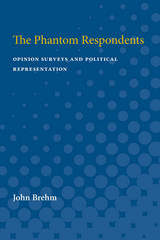
The Phantom Respondents
Opinion Surveys and Political Representation
John Brehm
University of Michigan Press, 1993
Polls and surveys pervade political and social life in ways that are both conspicuous and subtle. We gauge the success of presidential aspirants by how well they scored in polls broadcast on the nightly news. Our political leaders and candidates for every major office study the polls to identify the public's preferences on controversial policies. The Phantom Respondents develops the simple premise that public opinion surveys and polls have become a modern vehicle for political representation, and that as such, we must attend to the quality of representation that surveys and polls provide. For all the many and varied uses of surveys and polls, there is one weakness common to all: the steadily rising numbers of people who refuse to answer the interviewer's questionnaire. The irony is biting: at the very same time that we grow more dependent upon surveys and polls, the representativeness of the same polls and surveys is in jeopardy. Survey nonresponse undermines the fairness of surveys, amplifies inequalities in political representation, and imperils scientific research by misrepresenting general public opinion. This book will be of interest to anyone who uses data from survey research. While the specific focus of this book is aimed at the effect that survey nonresponse has upon understanding politics, scholars in such diverse fields as economics, sociology, and epidemiology could easily draw extensions to their primary concerns.
[more]
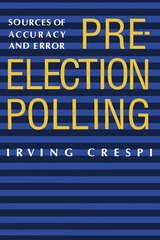
Pre-Election Polling
Sources of Accuracy and Error
Irving Crespi
Russell Sage Foundation, 1988
Since 1948, when pollsters unanimously forecast a Dewey victory over Truman, media-sponsored polls have proliferated, accompanied by a growing unease about their accuracy. Pre-Election Polling probes the results of over 430 recent polls and taps the professional "lore" of experienced pollsters to offer a major new assessment of polling practices in the 1980s. In a study of unusual scope and depth, Crespi examines the accuracy of polls conducted before a range of elections, from presidential to local. He incorporates the previously unpublished observations and reflections of pollsters representing national organizations (including Gallup, Roper, and the CBS/New York Times Poll) as well as pollsters from state, academic, and private organizations. Crespi finds potential sources of polling error in such areas as sampling, question wording, anticipating turnout, and accounting for last-minute changes in preference. To these methodological correlates of accuracy he adds important political considerations—is it a primary or general election; what office is being contested; how well known are the candidates; how crystallized are voter attitudes? Polls have become a vital feature of our political process; by exploring their strengths and weaknesses, Pre-Election Polling enhances our ability to predict and understand the complexities of voting behavior. "Combines intelligent empirical analysis with an informed insider's interpretation of the dynamics of the survey research process....Should be studied not only by all practitioners and students of opinion research but by anyone who makes use of polls." —Leo Bogart, Newspaper Advertising Bureau, Inc.
[more]
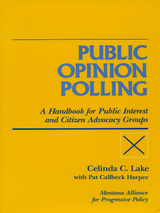
Public Opinion Polling
A Handbook For Public Interest And Citizen Advocacy Groups
Celinda Lake; Montana Alliance for Progressive Policy
Island Press, 1987
In Public Opinion Polling, Celinda C. Lake and Pat Callbeck Harper draw on years of experience and hands-on work in polling and interpreting public opinion polls for political candidates and public interest organizations. This handbook offers field-tested, easy-to-use, and cost-effective instructions for constructing and analyzing polls. Helps the user to: define the poll's objectives understand what a sample is write questionnaires that get the information you want conduct efficient interviews. Companion software provides a complete package for conducting polls and analyzing results.
[more]
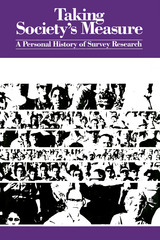
Taking Society's Measure
A Personal History of Survey Research
Herbert Hyman
Russell Sage Foundation, 1991
How are we, as members of a society, informed of conditions that affect our social welfare? How does the government register the impact of its actions on its citizens? The turbulent 1930s saw the emergence of sample survey research as an increasingly valuable technique of social inquiry. Perhaps no one championed this nascent discipline as vigorously as Herbert Hyman, one of those pioneering investigators whose talents were so closely associated with the rapid growth of survey research that their professional careers and reputations became virtually indistinguishable from the field itself. Hyman's personal account is a remarkable contribution to the history and sociology of social research. His experiences with the U.S. Department of Agriculture, the Office of War Information, the U.S. Bombing Surveys of Germany and Japan, the National Opinion Research Center, and the Bureau of Applied Social Research are all documented with fascinating insight into the critical events and prominent individuals that shaped the field of survey research between the late 1930s and the late 1950s.
[more]
READERS
Browse our collection.
PUBLISHERS
See BiblioVault's publisher services.
STUDENT SERVICES
Files for college accessibility offices.
UChicago Accessibility Resources
home | accessibility | search | about | contact us
BiblioVault ® 2001 - 2024
The University of Chicago Press









